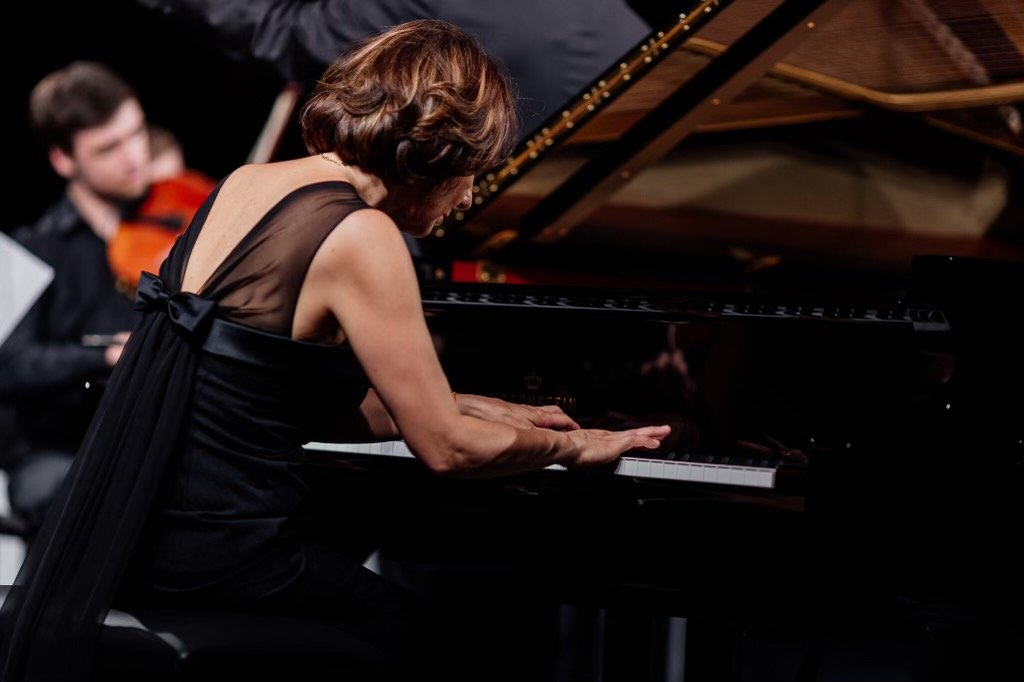
Reviews & Articles
Reviews
"My longtime favorite recording (of the Shostakovich Concerto) has been the one with Argrich and Faerber on Deutsche Grammophon which features the outstanding trumpet playing of Guy Touvron. But I think this version with Rankovich now takes pride of place. It's really quite stunning..."
"What I like about Rankovich's performance is that she's not afraid to get her hands bloody kneading the raw meat. She doesn't try to sanitize the music, but plays it for what it is and all it's worth. the only other version I know that matches Rankovich for fearless foulness is Martha Argerich's Deutsche Grammophon recording, and that's high praise indeed.."
— Jerry Dubins / Fanfare
"One can find evidence of her musicality on nearly every page here - for throughout the recital, she fuses firm technique with unfailing interpretive imagination to produce performances of consistently striking character."
— Peter J. Rabinowitz / Fanfare
"Rankovich, one of those miracle musicians who can make musical architecture breathe and come alive, can also thrill you just with her sound. I have seldom heard the musical climax to phrases so tellingly prepared for and placed without losing a sense of the thrust of the entire movement. Most of the works here don't require a pianist this good. Certainly the Crestons don't, despite their genuine attractiveness. Still, she lavishes her considerable musicianship on them and makes a persuasive case. You know just how good a musician she is when you realize that the Creston and the Giannini works are premiere recordings. To all intents and purposes, she's the moonwalker. She hasn't heard these pieces before. Later interpreters will take her readings into account."
— Steve Schwartz / Classical.net
"Finally came Tatjana Rankovich, whom I've heard for the first time. Her first piece was Robert Muczynski's Desperate Measures (1994). You might very well ask, "Who needs another Paganini Variations?" Apparentlythe audience tonight did. Mr. Muczynski's variations are not as virtuosic when compared to those of Brahms and Rachmaninov, but still fierce and demanding. The most interesting of them was No. 11 with its dance-like rhythm and jazzy scales. Ms. Rankovich gave each variation its own character deriving an endless amount of sonorities. By the end of the last variation, which ends in an ethereal chord, I imagine many in the audience were ready for another twelve.
The Fugue, Interlude and Finale (2002) from Bruce Stark was the last piece. Immensely difficult to play, the fugue was fitting for Ms. Rankovich's talents, which were needed to bring out the almost transparent third and fourth voices. The subjects sometimes appear as mere accompaniments and they demand extra attention from the listener, and I can't presume to have understood the piece completely from my initial exposure. The quieter middle interlude is designed to draw unique sonorities from the piano. Its Zen-like quality soon gives way to the frantic finale, which is highl virtuosic. Tatjana Rankovich pulled off this segment without any apparent difficulties and walked away from the music wrestling against itself as the clear winner."
— Alain Matlon / Musicweb International (Jan-June 2008)
"The second half belonged to Tatjana Rankovich (who teaches at Mannes College of Music), with the world premiere of Mr. Rubenstein's Romance No. 2 (aurora), a graceful exercise in legato simplicity occasionally diving into more complex pools. Her introspection matched the composer's, whose inspiration seemed not far from say, Scriabin, but with tiny touches showing an introspective mind at work. She ended the evening with four of Henry Martin's Preludes and Fugues, a set mirroring the layout of Bach's Well-Tempered Clavier. The slight acidity and irregular meters of No. 7 are followed by the delicate prelude of No. 4, which ends with a thunderous fugue. No. 9 begins with a scherzo flirting with tango, and in No. 13, subtitled "A Slow Drag," the prelude's main theme combines with the fugue in a virtuosic finish. These are hardly pieces for the timid or those without expert chops, and Rankovich seems to know them inside and out, always making Martin's voicing easily audible and playing with casual brilliance, lightness and humor."
— Bruce Hodges / Musicweb International (Jan-June 2008)
"As a chaser to the Gershwin Piano Concerto, one could hardly do better than Nicolas Flagello's piano concertos. In them one finds a similar energy, brashness and soaring lyricism, but suffused with the existential component of a life intensly agaist the grain. The album listed features the 22-year-old's first Piano Concerto, animated with blazing conviction by the astounding Tatiana Rankovich. An Absolute Classic!"
— Adrian Corleons / Fanfare (Nov-Dec 2007)
"...More than simply an accomplished pianist, she is an intelligent artist, capable of bringing to life a work that has never been played before, and making it sound like an established masterpiece."
— Fanfare
"...performed with an exquisite touch, and displayed commanding and deeply probing qualities of expression."
— La Libre Belgique, Brussels
"Her artistic and technical mastery allows her to attain rigorous perfection of execution without sacrificing the necessary quality of creative fancy."
— Gazetta Del Sud, Catania, Italy
"Tatjana Rankovich displayed a richness of artistry and a depth of commitment which assure her a future on the concert stage."
— NIN, Belgrade
"She achieved a perfect balance of structural clarity, tonal resonance, subtle nuance and expressive abandon while preserving a flawless continuity."
— Le Soir, Brussels
"Tatjana Rankovich's interpretation of the Liszt A Major Concerto was at once subtle and powerful. Her playing had a truly extraordinary charm and beauty."
— Borba, Belgrade
Articles
An interview with a gifted pianist
— Robert von Bernewitz
15 Questions to Tatjana Rankovich
— Tobias Fischer, Tokafi
Music & More Series Explores Artistic Marriagest
— NY Times




